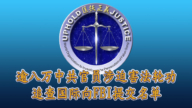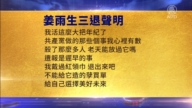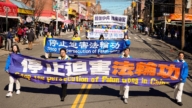【新唐人2011年10月21日讯】中共设立的“国家防火墙”,阻止了很多美国公司为中国大陆互联网用户提供服务。最近,美国驻世贸组织大使迈克尔•彭克,致信给中国世贸大使,要求中共政府阐述清楚,在互联网服务中如何实施法规和其他措施。请看本台记者报导。
美国驻世贸组织大使迈克尔•彭克在发给中国世贸大使的信中表示,有些在中国以外的公司向中国客户提供服务的时候面临挑战,因为他们的网站被中共政府设立的防火墙屏蔽。许多服务提供商向美国政府表达了对这个问题的不满。
彭克在信中写道:美国没有挑战北京限制互联网言论自由,不过华盛顿认为,全球互联网经济和社会发展会受益于:鼓励自由信息流通和尊重个人权力和责任的政策。
中国艺术研究院学者吴祚来表示,如果关起门来,对经济与文化交流都有伤害。
中国艺术研究院学者吴祚来:“如果国家保持这类防火墙老是屏蔽信息,一个是对我们中外这个经济影响是不好的,因为你看看给很多公司带来不便。 ”
知名IT评论人、曾任雅虎中国总经理的谢文表示,中共政府为了实现封锁的目地,把不该封锁的也封锁了。
谢文:“随着互联网在世界范围内越来越普及,互联网扮演的角色越来越重要,无论是政治、经济、文化、贸易和一般的我们叫公民间的交往,越来越依赖于互联网,全球化的趋势越来越明显,任何拒绝或者阻碍这个趋势,我觉得最终影响这个国家的发展,从而降低这个社会的政治文化的发展,也降低了经济上的竞争力。这是可以肯定的。”
美国的网购服务公司eBay 首席执行官约翰-多纳霍日前表示,虽然中国在2001年加入了世贸组织。但是它有很多方面没有按照世贸组织的规范来做。
彭克在信中也表示,2010年6月,中共政府关于互联网的白皮书,引发了其他一些问题。但为了有助于美国公司更好的为中国市场服务,中共政府就要阐述清楚在互联网服务中,如何实施中共政府政策的法规和其他措施。
谢文:“早就该抗议,早就该争取在国家层面,让世界贸易组织成员来解决这个问题。中国网民在使用国外网站的时候,现在面临着种种困难。它直接的﹙侵犯﹚中国网民的基本获取信息的权利、使用服务的权利,也侵犯了中国网民的基本的利益。付了网费,结果互联网不能正常使用。 ”
不过,在美国关注中国网络事务的李洪宽则认为,eBay在中国难以开展业务,是它没有按照在中国做生意的潜规则办事,就是说,eBay 没有贿赂买通中共政府官员。
BBC中文网报导,美国大使彭克的这封信没有做出威胁,没有说要在世贸组织内就这个问题对中国展开法律诉讼。不过,分析人士认为,这显示了世界最大的两个经济体之间,贸易紧张不断升级。
新唐人记者秦雪、唐睿、薛莉采访报导。
The CCP’s Internet Firewall
The national firewall set up by the Chinese Communist Party
(CCP) has prevented a lot of U.S. companies from providing services to Internet users in mainland China.
Recently, the U.S. ambassador to the World Trade Organization
(WTO), Michael Punke sent a letter to the Chinese WTO Ambassador,
asking the Chinese government to clearly explain how they
implement their Internet service regulations and other measures.
U.S. Ambassador to the WTO, Michael Punke, sent a letter
to the Chinese WTO Ambassador,
saying, “Some companies based outside of China have faced
challenges offering their services to Chinese customers
when their websites are blocked by China’s national firewall."
Many service providers have expressed their dissatisfaction
to U.S. officials, regarding this issue.
Punke assured China saying that the United States
was not challenging Beijing’s restrictions on free speech
on the Internet even though Washington believes that
on “economic and social development of the Internet globally
is best served by policies that encourage the free flow of information
and prioritize individual empowerment and responsibility."
Wu Zuolai, a Chinese Academy of Arts scholar said,
“If we shut the door on each other, it will bring about economic and cultural difficulties.”
Wu Zuolai: “If the firewall always shields countries
from information, it will adversely effect the economy and inconvenience many companies."
Xie Wen, a well-known IT commentator
and former general manager of Yahoo China said,
“In order to achieve the goal of a total Internet blockade,
the CCP has blocked sites that really should not be blocked.”
Xie Wen: “With the Internet becoming increasingly popular
in the world, the Internet plays an increasingly important role.
For economic, political, cultural, trade, and general exchanges
between our citizens, people rely on more and more on the Internet, creating an obvious trend towards globalization.
Rejecting or restricting this trend, I think will ultimately affect
the country’s development, thereby hampering its social, political,
and cultural development, or in other words,
the competitiveness of the economy. This is certain."
John Donahoe, CEO of the online shopping company, eBay,
commented that although China joined the WTO in 2001, it has not followed WTO norms in many regards..
Punke also said in his letter that in June 2010,
the Chinese regime’s white book on the Internet led to other problems.
In order to help U.S. companies better serve the Chinese market,
the CCP should clearly explain how it implements its Internet policies, regulations, and other measures.
Xie: “We should have protested earlier on
and fought at the national level.
We should have let WTO members solve this problem.
When netizens in China use foreign sites, they face difficulties.
The Internet blockade not only directly violates Chinese netizens’
basic right to access information and to use the Internet,
but it also violates the fundamental interests of
Chinese netizens.
They pay good money to use the Internet;
however, many Internet resources are blocked.”
Li Hongkan, who is concerned about Chinese Internet services,
believes that eBay failed in China because it did not follow
the unspoken rule of doing business in China, that is,
eBay had not learned the importance of bribing Chinese officials.
The BBC Chinese network reported, that Punke’s letter
did not threaten the CCP,
nor did it say that the United States |wanted to
start legal proceedings in the WTO on this Internet issue.
However, analysts believe that this shows
escalating trade tensions between the world’s two largest economies.
NTD reporters Qin Xue, Tang Rui and Xue Li































